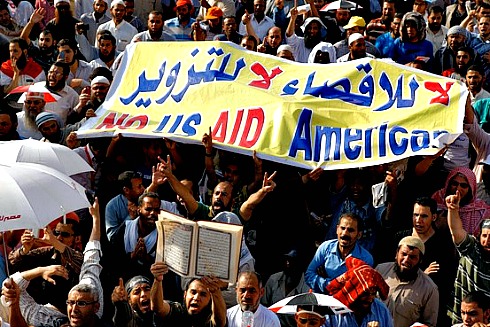Archives
AND MORE...

Encyclopedic Ignorance, Part Deux
_____________________

And Away We Go
____________________

One Small Step For Man...
____________________

Mr. Terrorist Goes To Washington
_____________________
June 29, 2012
Elections Have Consequences
Muslim Brotherhood leader Mohammed Morsi’s rise to power has upended Egyptians' perceptions of America's place in their domestic politics, according to the piece below. Jilted supporters of Ahmed Shafiq, who lost to Morsi in the election, are peddling the accusation that U.S. officials backed the Muslim Brotherhood's candidate. The US government denies this assertion and “insists it supported only a fair and transparent election process.”
Well, the U.S. government can insist and deny as much it wants, although U.S. government policy created this perception. Supporting fair and transparent elections is not tacit acceptance of their results, which is something the U.S. government neglects to mention to its own citizens, much less the rest of the world. Elections are a means to an end, not an end in itself. And most importantly, elections have consequences, i.e., the oft forgotten second half of the we-support-fair-and-transparent-elections declaration.
As the Palestinian elections clealy showed, terrorist groups can win fair and transparent elections. Does that mean the U.S. should deal with elected terrorist groups like Hamas? Or should the U.S. have made clear ahead of time, that electing terrorists to government means no future help or support from the U.S.?
Unfortunately, U.S. foreign policy today is so convoluted and inconsistent that neither our friends nor our enemies know what to expect. Hamas' victory and subsequent U.S. aid clearly indicate the U.S. will deal with terrorist groups if they manage to get elected. So what else will the U.S. tolerate? No one knows for sure, and that invites constant testing by others to see how far they can push the envelope.
As for U.S. policy makers viewing the abrupt change in Egyptian perception as “a rare opportunity for U.S. diplomats to recalibrate their relationship with Egypt” (emphasis added), policy makers should think long and hard about reinforcing the perception that political expediency is the driving force behind American foreign policy.
The Wall Street Journal | June 29, 2012
Egyptians Shift Views of U.S.
By Matt Bradley

Egyptians at a Cairo election rally in April called for cutting the country's traditional reliance on the U.S. Associated Press
CAIRO—As Muslim Brotherhood leader Mohammed Morsi prepares to become Egypt's first freely elected president on Saturday, his unlikely rise has upended Egyptians' perceptions of America's place in their domestic politics.
The regime of former President Hosni Mubarak received strong support from the U.S. government for decades, and his military received $1.3 billion of U.S. aid each year. The Muslim Brotherhood viewed the U.S. with suspicion, and the U.S. long reciprocated by limiting its interactions with the then-banned organization.
These days, though, some jilted supporters of former regime stalwart Ahmed Shafiq, who lost to Mr. Morsi in the election, are peddling the accusation that U.S. officials backed the Muslim Brotherhood's candidate, an assertion denied by the U.S. government, which insists it supported only a fair and transparent election process.
The Brotherhood, meanwhile, has publicly warmed up to the superpower that for decades looked on it with deep concern.
U.S. policy makers and Egyptian politicians say they can't predict how the changing perceptions of the U.S. will play out. But the abrupt change—with Islamists courting U.S. favor while military and old-regime loyalists assail their erstwhile U.S. backers—offers a rare opportunity for U.S. diplomats to recalibrate their relationship with Egypt.
"Things are definitely, definitely in play," said Elijah Zarwan, a senior fellow at the London-based European Council on Foreign Relations. "The Brotherhood and the military will be, after July 1, kind of roommates in the presidential palace, if you will. I think U.S. policy has to find a way to support them both."
For the time being, emotions among some liberals and supporters of the military and the former regime are raw. Before official election results were announced on Sunday, several politicians from liberal and leftist parties held a news conference to denounce the Brotherhood and, in the next breath, accused the U.S. of interfering in Egypt's internal affairs.
They pointed to comments by U.S. officials that they said showed new U.S. support for the Brotherhood. Secretary of State Hillary Clinton, for example, after unofficial election results suggested Mr. Morsi had won, urged Egypt's military rulers to "turn over power to the legitimate winner."
To some secularists and former regime officials, the U.S. messages sounded like endorsements of the Brotherhood.
"Now we see the U.S. encouraging the military to hand over power in Egypt to the Muslim Brotherhood," said Osama Al Ghazali Harb, a former member of Egypt's U.S.-backed former ruling party and now the head of the secular-minded Democratic Front Party. "We refuse that the Muslim Brotherhood should come to power leaning on American support."
U.S. officials say they didn't take sides. "There was a perception among many groups who supported Shafiq that we actively backed Morsi," said a U.S. Embassy official in Cairo. "It's wrong. We didn't. We supported a process."
Relations between the U.S. and the Brotherhood, however, have improved dramatically since the uprising against Mr. Mubarak in early 2011. More here...
Log In »
Notable Quotables
"Mr. Netanyahu is one of the most media-savvy politicians on the planet. On Friday he appeared live via video link on 'Real Time with Bill Maher,' taking the host’s alternately sardonic and serious line of questioning with gazelle-like alacrity."
~ Anthony Grant, jourrnalist who has written for many major newspapers and worked in television at Paris and Tel Aviv, interviewing former PM Benjamin Netanyahu on Monday, at the outset of Mr. Netanyahu's new book (more here).
And Then Some
Dangling Israel
March 24, 2022
New Global Leaders
March 23, 2022
Ukraine Can Learn From Israel
January 31, 2022



